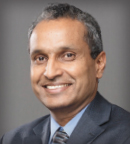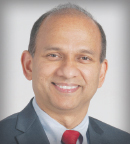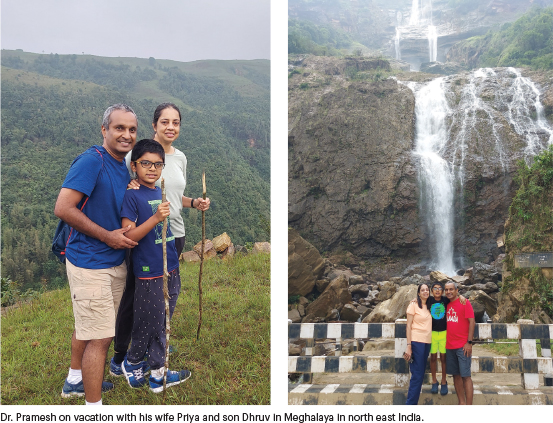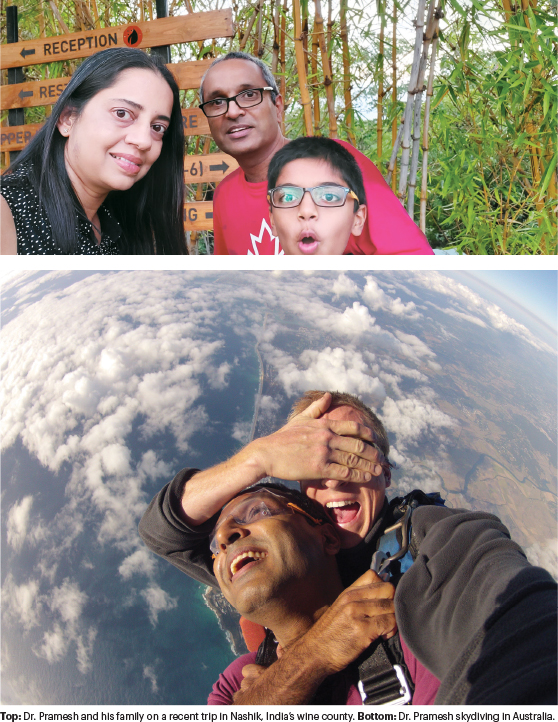In this installment of The ASCO Post’s Living a Full Life series, Guest Editor Jame Abraham, MD, FACP, spoke with C.S. Pramesh, MS, FRCS, Director of the Tata Memorial Hospital and Professor and Head of Thoracic Surgery at the Tata Memorial Centre, Mumbai, India. Dr. Pramesh is the Convener of the National Cancer Grid (India) and also serves on the Union for International Cancer Control Board of Directors.
Following His Brother’s Lead
Dr. Pramesh was born and reared in Coimbatore, one of the major metropolitan cities in the southern Indian state of Tamil Nadu, situated on the banks of the Noyyal River. His parent’s story illustrates one of the major differences in the traditional Indian perspective on marriage, which is not seen as simply the union of two people, but rather, as two families joining together; the bride and groom have a duty to provide their families with prosperity and progeny.
C.S. PRAMESH, MS, FRCS

On his training in oncology: “Medical college in India at the time was trial by fire, especially in the surgical specialties, where it was a grueling routine…. But it toughened us up and created an enormous appetite for work.”
On equity in cancer care: “One of the biggest problems we face is inequities in access to quality cancer care, with patients often having to travel thousands of miles to reach a good cancer center…. The National Cancer Grid (India) is an initiative to create uniform standards of cancer care across the country
and eliminate these disparities.”
On participating in social media: “It’s important for us to dissociate our professional and personal roles and be open to criticism. But in today’s era, I think we need to be more than just physicians. We need to be movers of social change.”
“My mother was Professor of Plant Biology and Genetics at the Tamil Nadu Agricultural University, which is one of the largest agricultural universities in India. My dad was the Dean of the College of Agricultural Engineering and a soil conservationist in the same university. So, his basic qualifications were in agricultural engineering and soil and water conservation. When they met at the university in the 1940s, their respective families were not supportive of their decision to marry each other, and they had to wait 17 years before they finally married! Remember, this was the 1940s and 1950s, where the sociocultural situation in India was very different from what it is today,” explained Dr. Pramesh.
Asked about his decision to pursue a career in medicine instead of following in his parents’ academic footsteps, Dr. Pramesh replied: “I don’t know the exact time I made the decision. At the time when I was in higher secondary school, my elder brother, who was about 4½ years older than me, was training to be a doctor. He was in his final year of his MBBS degree, and when I had to make my career choice, I think he inspired me to take up medicine.”
A Surgical Career Is Set in Motion
After graduating from school and scoring well on his board exams, Dr. Pramesh entered Coimbatore Medical College, full of enthusiasm but uncertain about what specialty he wanted to pursue. “It’s strange because up until my final year in medical school, I was a hardcore medical physician—that is, nonsurgical. I was leaning toward neurology because I was always fascinated by mathematics, and neurology is a perfect marriage between mathematics and medicine, a very systematic way of approaching a diagnosis. But my internship changed all that. The first day I entered an operating room and witnessed (coincidentally) an esophageal resection surgery; it was transformative, and I was an instant convert from neurology to surgery. I wasn’t sure what branch of surgery to take, but I was convinced that as soon as my internship was over, I’d try and pursue a career in general surgery,” said Dr. Pramesh.
GUEST EDITOR

Jame Abraham, MD, FACP
Asked about an early mentor, Dr. Pramesh replied: “In 1992, when I finished my undergraduate studies, I wanted something beyond what my internship could offer, in terms of surgical training. Coincidentally at that time, the pediatric surgery program at Coimbatore Medical College did not have residents or fellows in their department, and they were always looking for volunteers to work outside of office hours with their pediatric surgical work. I volunteered at the pediatric surgical department for an entire year during my internship and was on call every single day. I used to stay in the hospital interns’ quarters, going home for a few hours once a week.”
Dr. Pramesh continued: “During that incredibly busy period, I was fortunate to be mentored by Dr. V.R. Ravikumar, who was Head of Pediatric Surgery at that time. He was an outstanding surgeon and leader, and many of the principles he instilled when I was about 22 or 23 years old stick with me even now. Sometimes when I’m faced with a moral dilemma, I think back to what he would have decided. He’s in his 80s now but is still quite active, and we stay in touch. He’s been a huge influence in my life.”
‘Surgery or Nothing’
Given the limited entry positions in certain medical specialties, Dr. Pramesh’s career path ran into hurdles. “I had decided it had to be surgery or nothing. Given the fierce competition for the field in the Indian postgraduate medical system, I had almost a 2½-year gap between my undergraduate and postgraduate studies, which were difficult times, filled with uncertainty about the future. During that period, I had a lot of pressure from well-intentioned people suggesting I look at alternative specialties, such as anesthesiology. But I’m glad I decided to pursue surgery at any cost because it really paid off in the end,” he said.
Dr. Pramesh explained that during the “uncertainty phase” of getting into a postgraduate surgical training program in India, he went to the United Kingdom and took the Professional and Linguistic Assessments Board (PLAB) test, which helps ensure that doctors who qualified abroad have the right knowledge and skills to practice medicine in the UK. “As it turned out, I received news that I had been selected for postgraduation in surgery at the King Edward Memorial Hospital and Seth Gordhandas Sunderdas Medical College in Mumbai, but as I’d already paid a rather high fee for the PLAB, I went to the UK, took the test, and passed it. I requested a 6-month delayed start for my postgraduation, which I was very fortunate to get, and worked in the UK for some months before returning home to postgraduate training in Mumbai.”
A Stint at Tata Memorial Cements a Career in Oncology
Asked about his decision to enter the challenging field of oncology, Dr. Pramesh responded: “Medical college in India at the time was trial by fire, especially in the surgical specialties, where it was a grueling routine; I wouldn’t really recommend it for training our current crop of young doctors, as it didn’t offer a healthy work-life balance. However, it toughened us up and created an enormous appetite for work.”
Dr. Pramesh continued: “As part of my 3-year training, which led to my postgraduate degree, we were offered two elective rotations of 3 months each. I chose to work across the road at the Tata Memorial Hospital in surgical oncology; at that time, King Edward Memorial Hospital did not have a separate surgical oncology department. So I did a 3-month rotation at Tata Memorial in surgical oncology and got hooked on the challenges that surgical oncology had to offer. After that, all that remained was to get into a surgical oncology residency at Tata Memorial Hospital.”
Valued Mentor
Dr. Pramesh noted that the difficult road to a career in surgical oncology was made possible by several mentors, such as Dr. S.K. Mathur, who was the head of Dr. Pramesh’s surgical unit when he joined as a first-year trainee. “Dr. Mathur was a senior general and gastrointestinal surgeon; he would go through every aspect of patient care and education with extreme dedication and commitment. His main interest was gastrointestinal surgery, and he was one of the foremost leaders in surgery for portal hypertension, which at that time was fairly common. However, he would pay as much attention to a patient with a diabetic foot infection as he would to a patient with portal hypertension; every single discharge summary had to be approved and signed off by him! The philosophy that he brought into life and training was absolutely remarkable. His passion about medicine and patient care helped form my own philosophical approach to my work.”

Determined to Join Tata Memorial
After completing his training at King Edward Memorial Hospital, Dr. Pramesh applied for a residency in surgical oncology at Tata Memorial. However, his path to Tata Memorial faced another roadblock: the center had already taken its full complement of 10 residents, which was then the yearly quota. “I was discouraged but still left my CV in case something changed. As luck would have it, within 6 months of finishing my postgraduate term at King Edward, one of the residents at Tata Memorial got married and migrated, creating a vacancy that I was simply overjoyed to fill. I joined Tata Memorial in January 1999 and have never left except for a couple of short fellowships that I did in the United States and Japan. It is a great institution,” said Dr. Pramesh.
Asked why he has remained at one academic institution for his entire career, Dr. Pramesh replied: “First, as a matter of scope, we are a large comprehensive cancer center not unlike The University of Texas MD Anderson Cancer Center. We see about 46,000 new patients with cancer annually; MD Anderson sees 42,000. Furthermore, the culture and ethos at Tata Memorial Hospital are quite unique. It’s a very professional culture that is also imbued with dedication and humanity.”
Dr. Pramesh continued: “One of the best things about Tata Memorial is that there is no hierarchy, which is rare in India. I’ve found a lot of humility among the people who work here while they are at the top of their field. They’re not reluctant to accept that there could be a way of doing things better. And to this day, we continue to evolve. I think that’s been the secret to how we have continued to remain preeminent in the field of cancer care in India. As you can tell, I love being Director of this great institution and cannot imagine working somewhere else.”
“Of course, the fact that I’ve stayed here for 23 years means that you’re not likely to get an unbiased answer to your question,” he added. “It’s something like the Eagles song “Hotel California”—you can check out any time you like, but you can never leave. I don’t have any scientific ways of justifying why I’ve remained here for so long. It’s more emotional.”
Big Picture Issues
As Director of Tata Memorial Hospital, Dr. Pramesh wears multiple hats, and, as he noted, the size and complexity of the institution’s mission can be overwhelming. Asked what his priorities are, he said: “I’m very proud of the high quality of evidence-based care that we provide. Where we may be lacking is in the overall patient experience. We are inundated with patients from all over the country and from neighboring countries as well. The result is that in a very small area, we have a huge number of patients, which creates overcrowding and all the unsatisfactory issues that result. So, patient satisfaction is something we are very keen to improve with some process-related changes. Given the restrictions we have by way of space, we have plans to expand and modernize our campus in the next 4 or 5 years.”
Dr. Pramesh continued: “At a national level, there is a lack of research opportunities. The current lab and clinical research projects are focused in the high-volume academic centers like ours, but this does not filter down into the mid-sized and small-sized facilities. If we truly want to expand and build on India’s strengths, we need research to percolate at the lowest level, in all the medical college hospitals and all the district hospitals. Finally, and most importantly, one of the biggest problems we face is inequities in access to quality cancer care, with patients often having to travel thousands of miles to reach a good cancer center. It is a huge barrier to care—something that we need to address.”
National Cancer Grid
As the discussion of access to care continued, Dr. Pramesh noted that the National Cancer Grid, which was established in 2012, now includes 284 cancer centers, research institutes, patient advocacy groups, charitable organizations, and professional societies. “About a decade back, we analyzed problems in India’s approach to cancer treatment, and one of the first things we did was to try and map out the patients who came to Tata Memorial. Based on a 75,000-patient study that geotagged every single patient based on the location of their homes, we realized there were wide areas of the country where patients were traveling thousands of kilometers to come to Tata Memorial. I can only imagine the kind of financial, social, and familial challenges they had to go through,” he said.
In 2012, Dr. Rajendra Badwe, Director of the Tata Memorial Centre (and Dr. Pramesh’s mentor), and Dr. Pramesh invited the leadership from 29 regional cancer centers to be part of a cancer network with a broad mandate to create uniform standards of care throughout India. “We were fairly vague as to what our ambitions were, and the first years were not without problems. That said, the National Cancer Grid has been fairly transformative in the way we practice medicine in India. Today, with over 280 members, the National Cancer Grid centers treat over 750,000 new patients with cancer annually (which is 60% of India’s cancer burden). Personally, I’m hoping it goes beyond the realms of cancer care into various other areas like cardiology, nephrology, and neurology, because the model we’ve created is very easily replicable across these specialties. There’s a lot of work ahead, but we’re moving in the right direction.”

Social Media: Choosing a Medium Wisely
Dr. Abraham noted the growing influence of social media and asked Dr. Pramesh to share his thoughts on the subject. “I’ve experimented with most social media and have found most of them to be frivolous and without value for the time you spend on them. But one of the social media platforms that does offer value is Twitter. I don’t spend too much time on it, but it is a very powerful medium. We would possibly be short-changing ourselves if we didn’t use it to promote what we passionately believe in. It’s important for us to dissociate our professional and personal roles and be open to criticism. In today’s era, I think we need to be more than just physicians. We need to be movers of social change—while most physicians are passionate about the care they provide their patients, social determinants are probably more important than the delivery of health care itself. That is why we all need to wear our public health hat also. We need to be unafraid of expressing opinions that might be necessary to share with the public. Personally, I feel uncomfortable suppressing an emotion or a thought just because of the professional roles I play.”
Decompression Time: Family, Puppy, Formula 1
How does a busy cancer center director decompress? “To me, family fulfills that role,” Dr. Pramesh began. “I’ve always been in a closely knit family, but especially over the past 2 decades, events have transpired that make me value my family much more. You know life is temporary, and you need to savor the shared moments of joy and happiness you have with your family. And speaking about family, our latest addition is Sandy, an almost 2-year-old rescue pup we adopted in January 2021, and he’s transformed our lives to a remarkable extent. My day starts with making sure Dhruv—my 9-year-old son—gets ready for school and off to the school bus. My wife Priya also works at Tata Memorial as a thoracic anesthesiologist, so I can’t get away from her, even in the operating room!”
Dr. Pramesh continued: “One of the true joys of life has been traveling with family. And my final decompression activity is watching Formula 1 racing with my son. We are Formula 1 junkies, and we’ll do whatever it takes to watch a Formula 1 race on television. While I have watched a few races on the track, taking Dhruv to a race track for an F1 race is on the bucket list. So, overall, I have a reasonably good work-life balance.”
Closing Thoughts for Young Oncologists
Asked to share a closing thought, Dr. Pramesh said: “I’m not sure I have the requisite amount of gray hair it takes to provide wisdom, but my strong advice would be to follow your passion, wherever it takes you, and not to compromise on your ideals if you’re faced with an ethical dilemma. Be unafraid: in the long run, I don’t think it matters what stance you take so long as you are making decisions for the right reasons, and you are convinced about it deep down.”

